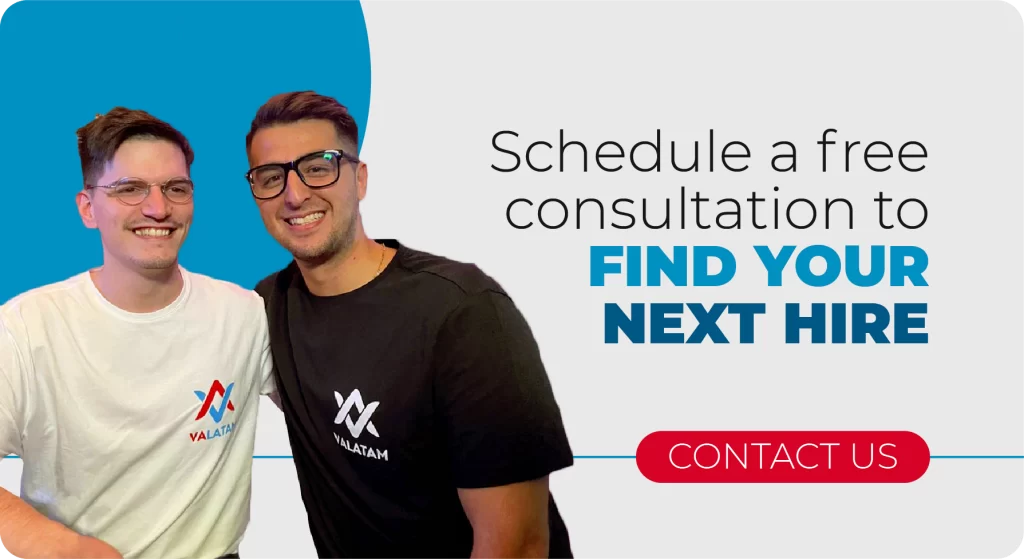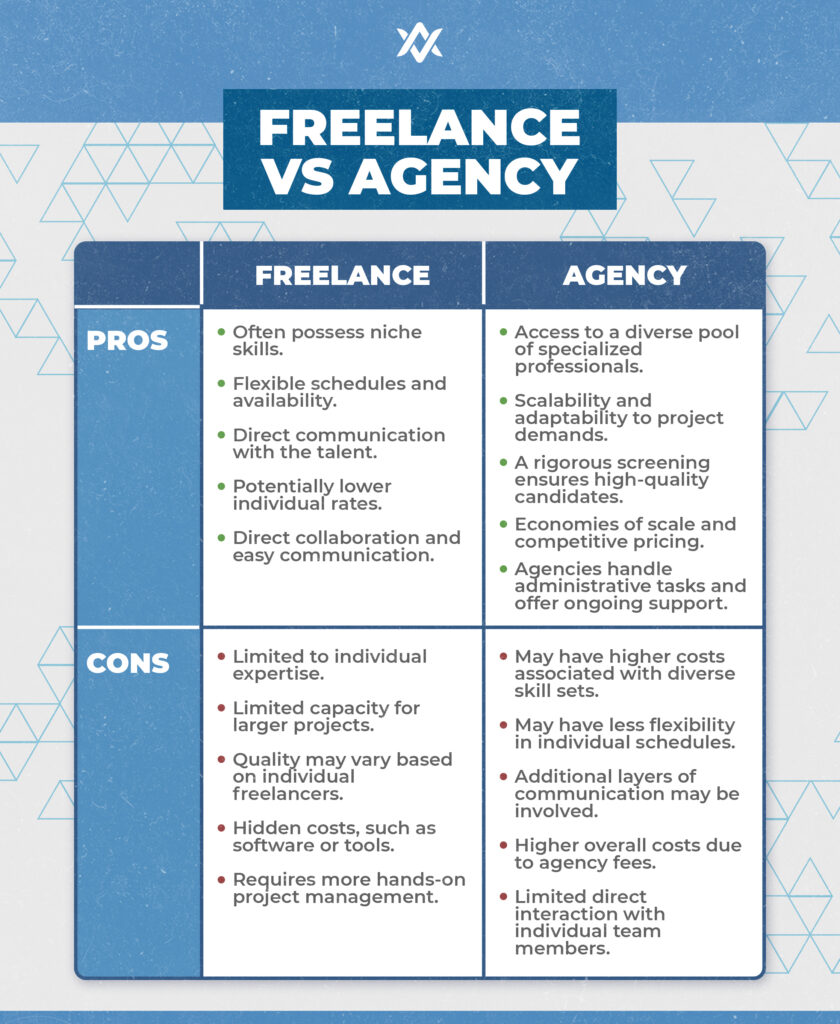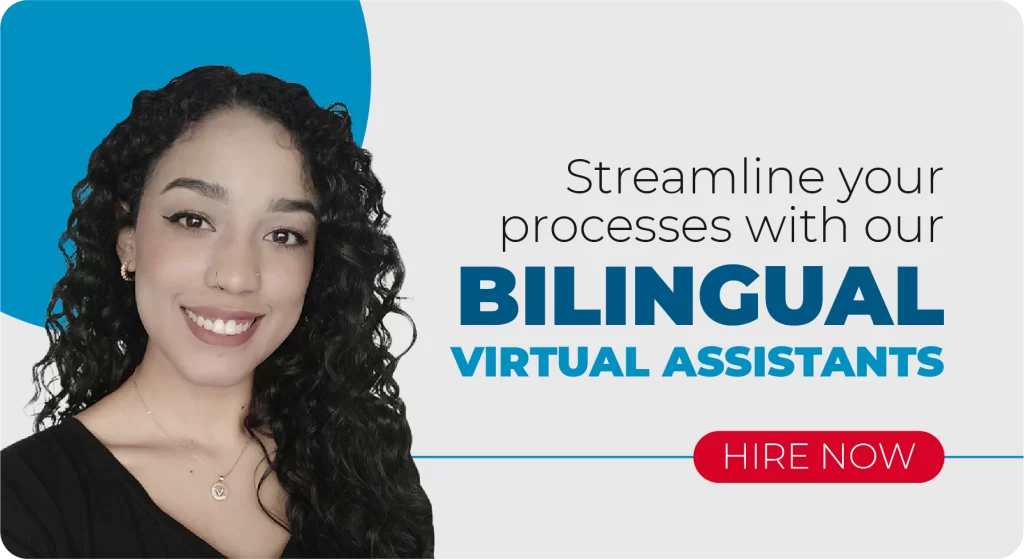Navigating remote hiring? Whether choosing an agency or a freelancer, discerning the differences is crucial. Staffing agencies offer access to a vetted pool of industry-specific professionals, saving time and ensuring immediate impact. They also provide reliability through administrative support, allowing focus on core business activities.
When deciding between nearshoring vs offshoring, businesses weigh the benefits of geographical proximity and cultural alignment offered by nearshoring against the potential cost savings and global talent pool accessibility associated with offshoring.

How a freelancer can help improve your projects
Freelancers are independent professionals who offer their services on a project basis, typically working remotely. They operate as self-employed individuals and may provide services across various industries, such as writing, design, programming, and more. To learn more about virtual assistants, check out this article: “How can a virtual assistant help your business?”
According to the U.S. Bureau of Labor Statistics, “freelancers, also known as independent contractors, are individuals or entities hired to perform specific tasks or complete projects for a fee.”
How do they work?
Freelancers operate as independent contractors, working on a project basis for clients. Clients hire freelancers to complete specific tasks or projects, and the arrangement is often temporary or short-term. Freelancers typically set their own rates, manage their schedules, and work remotely, providing flexibility for both parties.
Communication and project coordination are usually facilitated through digital platforms and collaboration tools. Payment terms are agreed upon in advance, with freelancers often receiving compensation upon completion of the project or based on agreed milestones.
How agencies elevate your projects
An agency is a professional service provider that connects businesses with skilled individuals or teams to meet specific needs, often in the context of hiring temporary or project-based workers.
According to the U.S. Small Business Administration (SBA), “an agency plays a crucial role in linking businesses with qualified workers, facilitating effective workforce solutions.”
How do they work?
Agencies streamline the hiring process by acting as intermediaries between businesses and skilled professionals. They consult with clients to understand their needs, source, and vet qualified candidates, and facilitate the client-candidate match.
Agencies handle contractual arrangements, ensuring compliance with employment laws, and may offer ongoing support throughout the engagement. This approach simplifies hiring for businesses and provides assurance in the quality of the professionals engaged.
Differences between hiring from an agency vs a freelancer
When faced with the decision to hire for a specific project or task, choosing between freelancers and agencies involves careful consideration of various factors. Here’s a concise overview of the main differences between hiring freelancers and outsourcing with agencies:
When considering virtual assistants, businesses may compare the efficiency and cultural affinity of virtual assistants in the Philippines vs those in Latin America, weighing factors such as language proficiency, cultural understanding, and strategic time zone alignment.
“At Valatam, we don’t charge any additional fees to find your perfect talent match. All our VAs are pre-vetted and work within US timezones.” – Manager at Valatam
‣ Expertise and Specialization
- Freelancer (Pros): Freelancers offer flexibility in terms of schedules and availability, making them suitable for projects with varying timelines.
- Freelancer (Cons): On the flip side, individual freelancers may have limited capacity, posing challenges for larger-scale projects.
- Agency (Pros): Agencies provide scalability and adaptability to meet the demands of different project sizes and scopes, focusing on generating long-term work relationships.
- Agency (Cons): However, the flexibility of individual team members within an agency might be constrained.
‣ Quality Assurance
- Freelancer (Pros): Direct communication with freelancers allows for clear expectations and immediate feedback, potentially ensuring high-quality work.
- Freelancer (Cons): The quality of deliverables may vary as it depends on the capabilities of individual freelancers.
- Agency (Pros): Agencies employ a rigorous screening process to ensure the competency and reliability of their professionals, offering a higher level of quality assurance.
- Agency (Cons): However, additional layers of operations and communication may be involved, potentially leading to a longer hiring process.
‣ Costs
- Freelancer (Pros): Freelancers may offer potentially lower individual rates, making them cost-effective for certain projects.
- Freelancer (Cons): Hidden costs, such as expenses for specific software or tools, may impact the overall project budget.
- Agency (Pros): Agencies benefit from economies of scale, often providing competitive pricing for a comprehensive set of services.
- Agency (Cons): However, in some specific scenarios, the overall cost may be higher due to agency fees.
‣ Management and Support
- Freelancer (Pros): Direct collaboration with freelancers allows for easy communication and close project management.
- Freelancer (Cons): Managing individual freelancers may require more hands-on involvement in project coordination.
- Agency (Pros): Agencies handle administrative tasks, contract management, and offer ongoing support, allowing clients to focus on core business activities.
- Agency (Cons): The downside is that there may be limited direct interaction with individual team members, potentially impacting the depth of collaboration.
How to make the right choice
When making the right choice between hiring freelancers and agencies, consider factors such as experience level, proven high performance, and recommendations.
Assess whether you need a short-term solution or a long-term partnership, and evaluate your capacity for hands-on project management.
If you’re looking for a virtual assistant, explore the services on the Valatam page, where you can find skilled professionals tailored to various business needs. Visit Valatam for a comprehensive selection of virtual assistant services.
1. Experience level
Consider the experience level of the candidates or service providers. Evaluate their track record, examining both the breadth and depth of their expertise. Experience often correlates with a better understanding of industry nuances and the ability to navigate challenges effectively.

2. Proven High Performance
Look for evidence of proven high performance. Examine past projects, case studies, or portfolios to gauge the quality of work delivered. Consistent excellence in performance is a strong indicator of reliability and capability.
3. Recommendations
Seek recommendations from trusted sources. Reviews, testimonials or endorsements from peers, clients, or industry experts provide valuable insights into the candidate or service provider’s reputation and the satisfaction of their previous collaborators.
When is the best time to hire a freelancer?
- Short-term projects with specific deliverables: Freelancers excel in focused, goal-oriented projects.
- Tasks requiring specialized skills or expertise: Tap into freelancers for unique skill sets without a long-term commitment.
- Projects with fluctuating workloads or peak periods: Scale your workforce as needed to manage varying demands.
- Situations where flexibility in workforce size is crucial: Freelancers provide on-demand scalability.
- Need for cost-effective solutions without a full-time commitment: Freelancers offer efficient solutions for specific tasks.
- One-time or occasional tasks that don’t justify a long-term hire: Ideal for discrete, non-recurring projects.
- Experimentation with a new project or service: Test ideas without a long-term workforce commitment.
When is the best time to hire from an agency?
- Complex Projects: Agencies excel in managing multifaceted projects that require coordination across various tasks and skill sets.
- Need for Diverse Skills: If your project demands a range of skills, an agency can provide access to a curated pool of professionals with diverse expertise.
- Scalability Requirements: Agencies can quickly scale their resources to match the demands of your project or workload.
- Quality Assurance: Agencies often have robust vetting processes to ensure the quality and reliability of the professionals they deploy.
- Ongoing Support: For tasks requiring continuous attention, an agency can provide ongoing support, including administrative tasks, contract management, and additional resources when needed.
- Time-Saving: Sourcing and recruiting talent on your own might consume a lot of resources, agencies excel at finding the right talent, helping you get a curated list of profiles while saving time.
Where to hire the best virtual assistants?
When seeking the best virtual assistants, Valatam stands out as a premier destination for securing top-tier remote talent. Our specialized agency excels in providing US start-ups with virtual assistants and remote teams tailored to meet specific business needs.
Our agency’s commitment to delivering high-quality professionals from Latin America ensures access to a skilled workforce with a closer cultural fit, excellent English proficiency, and a dedication to long-term collaboration. Elevate your remote staffing experience by exploring the exceptional capabilities of virtual assistants sourced from Valatam.




